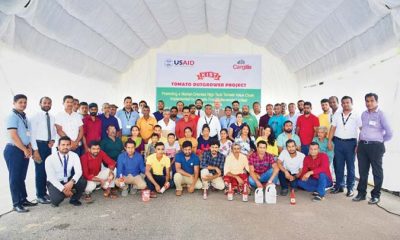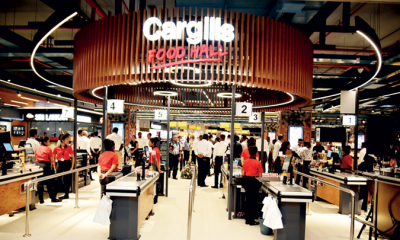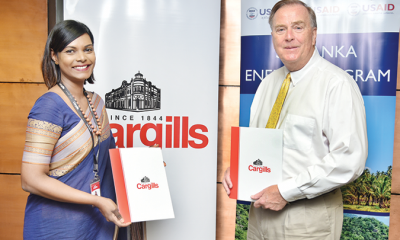Business
Cargills steps forward to purchase bumper tomato harvest, ensures farmer sustainability
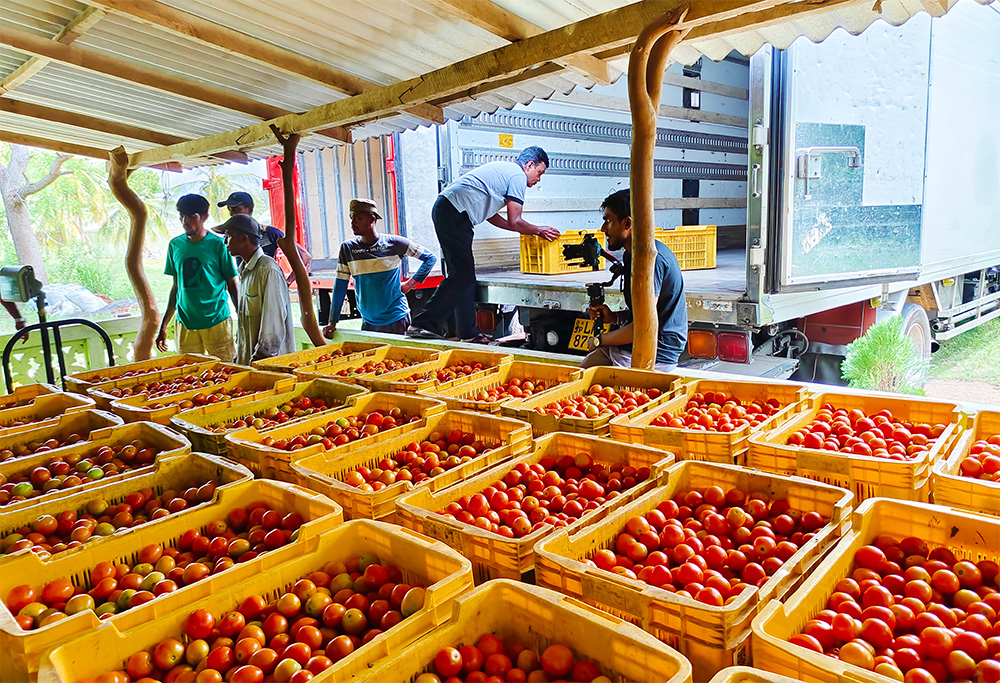
* Timely intervention prevents farmers from dumping their crop on open fields
* Purchased over 30 metric tons of surplus tomato on April 26
* The deal favourable for farmers is akin to a forward commodity pricing arrangement
* Surplus tomato will be processed to manufacture KIST tomato sauce
by Sanath Nanayakkare
KIST food brand operated by Cargills Ceylon PLC, has stepped forward to help out farmers with their bumper tomato harvest. The move facilitates the farmers to sell their produce to the company five-fold the price they can obtain elsewhere as if in a forward commodity pricing arrangement.
At a time the farmers are compelled to sell their bumper tomato harvest for as low as Rs.10 a kilo, Cargills has entered into agreements with the farmers to buy it at Rs. 50 a kilo with the objective of ensuring farmer sustainability.
Cargills KIST purchased over 30 metric tons of surplus tomato on April 26 from local farmers in Gageyaya (Monaragala district), Welimada (Badulla district), and Wangiyakumbura (Badulla district). By doing so, the company mitigated the significant risk these farmers faced to discard a substantial portion of their harvest.
The surplus tomato will be processed to manufacture KIST tomato sauce, at the company’s state-of-the-art manufacturing facility in Katana. It is the only Sri Lankan facility with aseptic processing capabilities which can convert and preserve fresh local tomato at highest quality standards, to use for tomato sauce production.
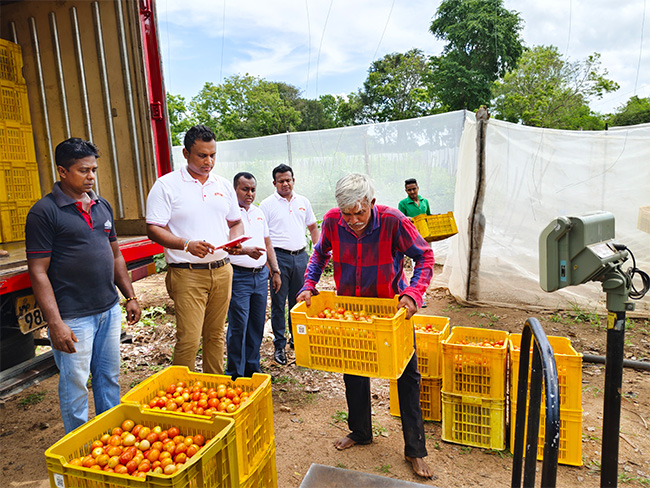
A farmer brings his harvest to check the box weight
This initiative underscores the company’s steadfast commitment to support the local farming community, with which it has had direct engagement for the last 25 years. By providing a consistent market for the farming community, the company is able to drive income to the rural economy and support livelihoods.
Cargills has made significant investments over the years to reduce post-harvest losses in the agriculture value chain in Sri Lanka.
The media had the opportunity to witness this initiative first-hand at Jeewangama, Thanamalwila on April 26. The distraught farmers began to flash a smile as they saw Cargills trucks were coming to their farms to purchase their bumper tomato harvest.
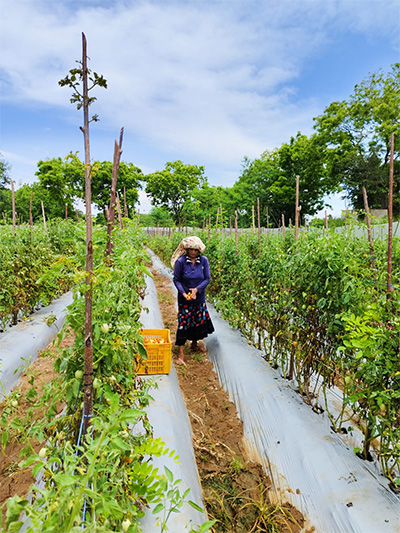
Farmer Malini chooses the best tomatoes to pick on her farm
Pix by Sanath Nanayakkare
Speaking to The Island, female farmer Malini said that tomato harvest has gone up substantially these days and the general market is not able to absorb the volumes they produce.
“As a result, the wholesale buyers of fresh vegetables in the market offer us only Rs. 10 for a kilogram of tomato. Tomato being a perishable produce, they know that we can’t wait for good selling conditions. Fortunately, Cargills has come to our rescue again. As you may recall from 2018, Cargills reached out to us to help out with bumper pumpkin harvest. We feel secure in our longstanding partnership with Cargills. The company has the capacity to use this tomato yield to make sauce, and we are assured that Cargills will buy any amount of tomato that will be harvested in the coming weeks at Rs. 50 a kilo. This price is five times higher than the price we can get elsewhere. Also, I must say that Cargills doesn’t differentiate the price depending on the size of tomato. If we go to other vendors, they sort the tomato into three size categories and quote different prices. Cargills doesn’t do that. They give us the agreed price regardless of the size of tomato. This is a great relief to us at this difficult time. One can imagine the pathetic condition of the post-harvest food loss if not for Cargills’ timely intervention,” she said.
Business
President and Indian PM jointly launch and inaugurate three development projects
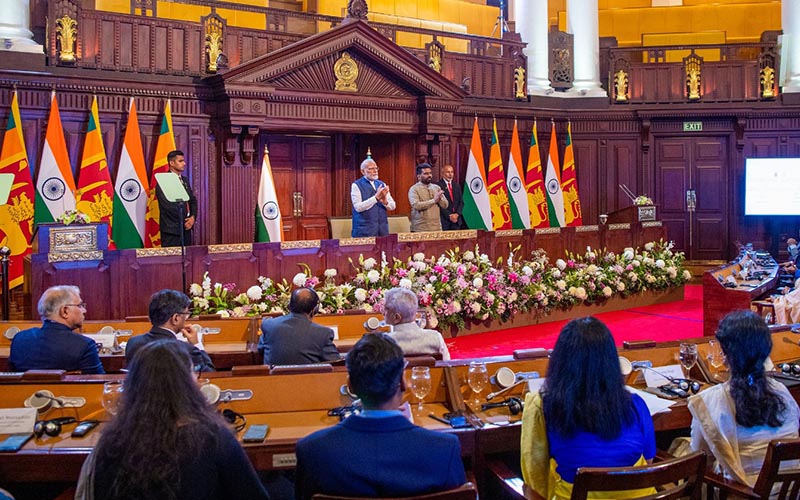
The inauguration and commencement of three development projects implemented in the country with the assistance of the Indian Government took place on Saturday (05)
These projects include the commencement of construction of the Sampur Solar Power Plant, which will add 50 megawatts to the national grid, the inauguration of the Temperature and Humidity Controlled Agro Cold Storage complex in Dambulla and the installation of solar panels on 5,000 religious sites. President Anura Kumara Disanayake and Prime Minister Shri Narendra Modi jointly inaugurated and launched these projects via virtual technology following their official meeting at the Presidential Secretariat on Saturday morning.
Prime Minister Modi’s visit to Sri Lanka reaffirms the concept of “Friendship of Centuries, Commitment to a Prosperous Future,” strengthening the deep-rooted ties between the two nations.
The Sampur Solar Power Plant is part of the Eastern Renewable Energy Zone, which is being established under Sri Lanka’s Long-Term Generation Expansion Plan (LTGEP). It is being developed by Trincomalee Power Company, a joint venture between India’s NTPC Limited and the Ceylon Electricity Board (CEB).
The project is planned in two phases, with the second phase scheduled to commence in 2027. A 500-acre land area has been allocated for this initiative, under the first phase it will contribute 50 megawatts of electricity to the national grid. The project will incorporate state-of-the-art N-type TOPCon solar cell technology, enhancing energy security and promoting a shift from fossil fuel dependency to renewable energy sources. Consequently, the Sampur Solar Power Project is expected to reduce annual carbon dioxide emissions by approximately 200,000 tonnes.
The Dambulla Agricultural Storage Complex (Cold Storage Facility), with a capacity of 5,000 metric tons and equipped with temperature and humidity control, was inaugurated today with the objective of reducing post-harvest losses by approximately 40%, stabilizing fluctuations in agricultural product prices, ensuring the supply of high-quality food to consumers and enhancing agricultural sustainability.
To facilitate research on advanced storage methods for different crops, the facility includes six storage chambers, each designed to simulate various climatic conditions. This is the first facility of its kind in Sri Lanka, built at a total cost of LKR 524 million, with LKR 300 million provided as a grant by the Government of India and LKR 224 million contributed by the Government of Sri Lanka.
The Government of India has invested USD 17 million on the project to install solar panels on 5,000 religious sites and places of worship representing all major religions in all 25 districts. The nitiative, is being implemented jointly by the Ceylon Electricity Board, the Sri Lanka Sustainable Energy Authority and Lanka Electricity Company (Pvt) Ltd.
Under this project, 5,000 solar panel systems with a capacity of 5 kW each will be installed on the rooftops of Buddhist, Hindu, Muslim, Catholic and Christian places of worship. This is expected to add 25 megawatts of solar power capacity to the national electricity grid. The initiative underscores the government’s commitment to a cost-effective, sustainable and reliable energy system.
[PMD]
Business
Will the U.S. 44% Tariff on Sri Lankan Exports Harm Key Industries? Examining the Impact and Sri Lanka’s Path Forward – Ambassador Kananathan

Sri Lanka’s export sector is grappling with a significant challenge following the United States’ decision to impose a 44% reciprocal tariff on Sri Lankan goods. This steep tariff threatens the country’s trade with the U.S., particularly in the apparel industry, which serves as a cornerstone of Sri Lanka’s economy.
Tea and Other Exports Also Under Threat
The repercussions extend beyond apparel, with tea exports at risk due to increased costs that may reduce Sri Lanka’s competitiveness against major producers like India, Kenya, and China. Other key export segments, including spices, seafood, and coconut-based products, are also likely to face price pressures, making it difficult for Sri Lankan exporters to sustain their foothold in the U.S. market.
Given that the United States is a major buyer of Sri Lankan goods, this move raises concerns about trade competitiveness, long-term sustainability, and economic stability. The question now is: how will this tariff impact Sri Lanka’s export-driven industries, particularly apparel, and what strategies can be employed to counteract the effects?
A Major Blow to the Apparel Sector – Sri Lanka’s Leading Foreign Exchange Earner
Ambassador Kana Kananathan, former High Commissioner to Kenya, has warned that this development could severely impact the apparel sector, which accounts for nearly 40% of Sri Lanka’s total exports. With U.S. buyers contributing approximately $3.3 billion annually, the apparel trade constitutes a crucial revenue stream for the nation.
A 44% tariff would substantially raise the cost of Sri Lankan apparel, making it less competitive compared to manufacturers in Bangladesh, Vietnam, Cambodia, and India. This could lead to a significant drop in orders from American buyers, posing a serious threat to the industry’s growth and employment rates.
Navigating the Challenge: Government and Industry Response
While immediate government intervention is necessary to mitigate these effects, businesses must also take proactive measures. Innovation, market diversification, and strengthening supply chain resilience will be essential strategies for overcoming these trade barriers. With the right approach, Sri Lanka can navigate this challenge and position itself more robustly in the global marketplace.
Ambassador Kananathan also suggested that exporters explore the ‘1/3 Cost-Sharing Model’ as a potential solution. Under this approach:
=Sri Lankan Manufacturers accept a partial reduction in profit margins, ensuring their products remain competitively priced.
=U.S. Retailers and Brands agree to absorb a portion of the tariff, recognizing the value of maintaining a reliable Sri Lankan supply chain.
=Raw Material Suppliers provide pricing flexibility, such as offering discounts or extending credit terms, to help offset cost increases.
By adopting these strategic adjustments, Sri Lanka’s export industry can mitigate the immediate impact of the tariff while laying the foundation for long-term trade resilience.
( Ambassador Kananathan was Sri Lanka”s former High Commissioner to Kenya and with concurrent accreditation to 23 African countries as well as Sri Lanka’s Permanent representative to UNEP and UN Habitat)
Business
Three Sinha Industries wins award for excellence at SLIA

Three Sinha Industries Pvt. Ltd. has been recognised with the Award of Excellence at the Sri Lanka Institute of Architects (SLIA) Annual Product Awards, held recently in Colombo. The award was presented for the company’s high-quality, fire-resistant doors, which are made using locally sourced materials and designed to meet the highest safety standards. The award ceremony was held recently in Colombo, and Managing Director Manjula Ariyakumara accepted the award on behalf of the company, marking yet another milestone in Three Sinha’s journey of excellence.
From its establishment as a small-scale business, Three Sinha has grown into a trusted name in Sri Lanka’s construction industry. The company has built a strong reputation for its commitment to quality, innovation, and reliability, earning both local and international recognition. Over the years, it has received several certifications for maintaining top-tier quality standards. Three Sinha has also received many other local and international awards.
Three Sinha Industries offers a diverse range of products and services, including roller doors, shutters, and fire-resistant doors that provide enhanced safety and durability. The company also specialises in aluminum fabrications, sensor doors, and automatic barriers, ensuring a comprehensive suite of solutions for the construction sector. Embracing sustainability, Three Sinha has expanded into green energy solutions, offering three types of solar PV electricity systems: on-grid, off-grid, and hybrid. Additionally, its subsidiary, IKLO Industries, focuses on pre-fabricated and pre-engineered steel buildings, incorporating advanced technology to meet modern construction demands. IKLO has also ventured into the agricultural sector by introducing tractor trailers tailored for farming needs. Moreover, the company manufactures high-quality diesel tanks that meet the standards of both the Ceylon Petroleum Corporation and the Indian Oil Corporation.
-

 Business2 days ago
Business2 days agoDaraz Sri Lanka ushers in the New Year with 4.4 Avurudu Wasi Pro Max – Sri Lanka’s biggest online Avurudu sale
-

 News7 days ago
News7 days agoBid to include genocide allegation against Sri Lanka in Canada’s school curriculum thwarted
-

 Business3 days ago
Business3 days agoStrengthening SDG integration into provincial planning and development process
-

 Business2 days ago
Business2 days agoNew SL Sovereign Bonds win foreign investor confidence
-

 Sports4 days ago
Sports4 days agoTo play or not to play is Richmond’s decision
-

 Features16 hours ago
Features16 hours agoStarlink in the Global South
-

 Latest News6 days ago
Latest News6 days agoIPL 2025: Rookies Ashwani and Rickelton lead Mumbai Indians to first win
-
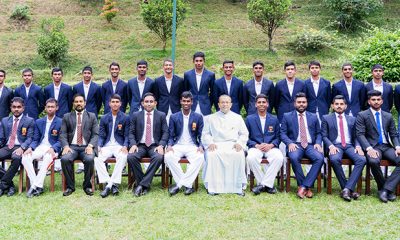
 Sports5 days ago
Sports5 days agoTrinity, St. Anthony’s out to end decade long victory drought




